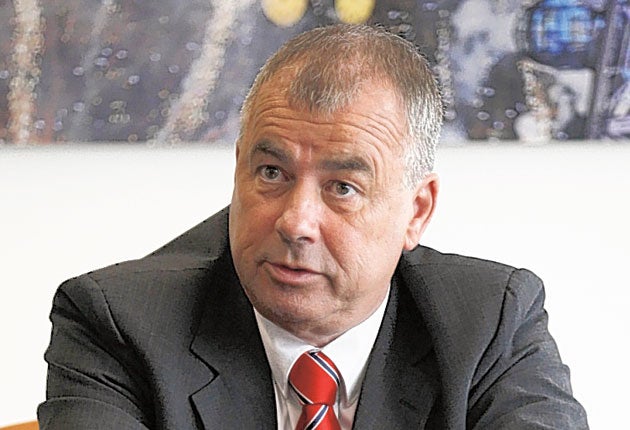Cuts could spark poll-tax style riots, says TUC union boss Brendan Barber

Your support helps us to tell the story
From reproductive rights to climate change to Big Tech, The Independent is on the ground when the story is developing. Whether it's investigating the financials of Elon Musk's pro-Trump PAC or producing our latest documentary, 'The A Word', which shines a light on the American women fighting for reproductive rights, we know how important it is to parse out the facts from the messaging.
At such a critical moment in US history, we need reporters on the ground. Your donation allows us to keep sending journalists to speak to both sides of the story.
The Independent is trusted by Americans across the entire political spectrum. And unlike many other quality news outlets, we choose not to lock Americans out of our reporting and analysis with paywalls. We believe quality journalism should be available to everyone, paid for by those who can afford it.
Your support makes all the difference.Brendan Barber, the TUC general secretary, has predicted poll tax-style protests when the Coalition Government's spending cuts start to bite.
As David Cameron told his Cabinet that it had reached the moment of truth in its search for big cuts, Mr Barber warned that a "volatile cocktail" of job losses, wage freezes, pension cuts and privatisation could lead to "difficult disputes" in the coming months.
Speaking before next week's annual TUC conference in Manchester, Mr Barber said: "The poll tax was defeated when MPs returned to Westminster to report that their constituencies were in revolt. The poll tax offended the British people's basic sense of what's fair. So will the spending cuts.
"Every coalition MP with a small majority and every coalition MP who fought an election to oppose deep early cuts needs to feel the pressure from their constituents to change course."
Accusing the Government of acting through "political choice" rather than necessity, Mr Barber claimed ministers were "hacking away" at public services. "Its programme of cuts, privatisation and redrawing the state is far more radical and dangerous than we have seen since the 1930s. Almost no part of the country, our economy or society will be left untouched," he said.
On his first day back at work after the birth of his daughter, Flo, Mr Cameron told the Cabinet the Government faced "significant challenges" in the weeks ahead – with the spending review at the top of its agenda. "This is the period when the rubber hits the road," he said.
Responding to the TUC's warning, the Prime Minister's official spokesman said: "The spending cuts are not something that the Government would choose to do, but it is something the Government is required to do because of the state of the public finances. We have the largest peace-time deficit. It is our objective to do that in a way that would take people with us."
The difficulty of finding cuts of 25 per cent in most departmental budgets will be highlighted next week when Frank Field, the Government's poverty tsar, warns Mr Cameron not to reduce spending on the under-fives.
In a report to the Prime Minister before the spending review, the Labour MP will propose the creation of an official index of life opportunities for all five-year-olds. He will warn that it would be absurd to ignore evidence that prospects for many children are already shaped before they start school.
Yesterday, the former Minister for Welfare Reform said that Labour's Sure Start scheme and other services for under-fives must be protected from cuts. He told a conference that he would not "sit idly by" while budgets for under-fives were threatened.
Mr Field said he will recommend "a range of intelligent interventions" that will improve the prospects of poor children before the age of five. He cited research showing that, by the time children start school, those from low-income families are already more likely to be at the bottom range of abilities. He said the most "gob-smacking findings" had been that many bright children from poor homes who are ahead of their wealthier classmates aged five have fallen behind by the time they are 10.
Asked how his review fitted with the threat of budget cuts to the Sure Start programme and services for under fives, Mr Field responded: "Given all that I have said it would be irrational of me to then submit a report and sit idly by if budgets for under-fives were actively under threat."
Join our commenting forum
Join thought-provoking conversations, follow other Independent readers and see their replies
Comments